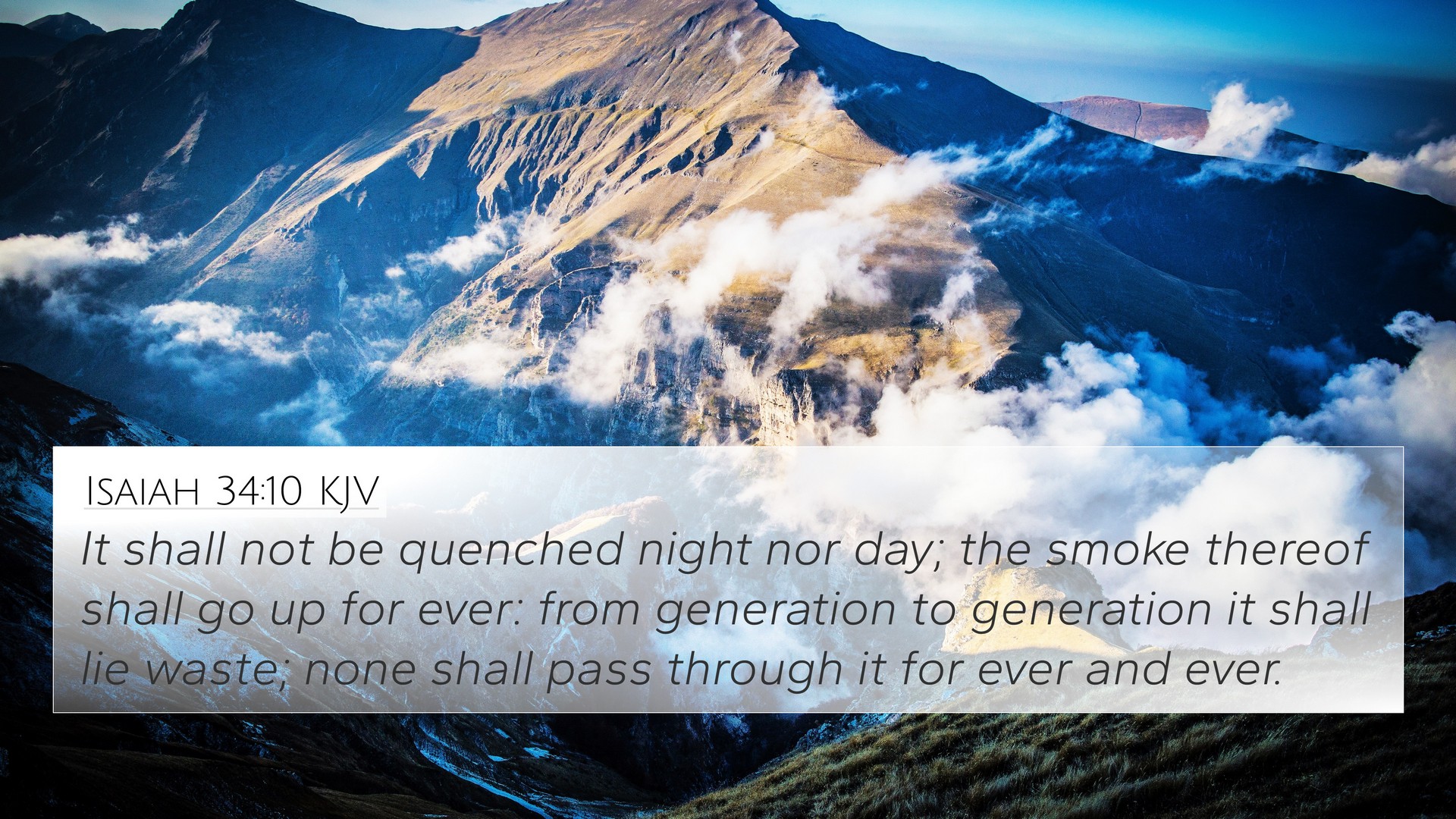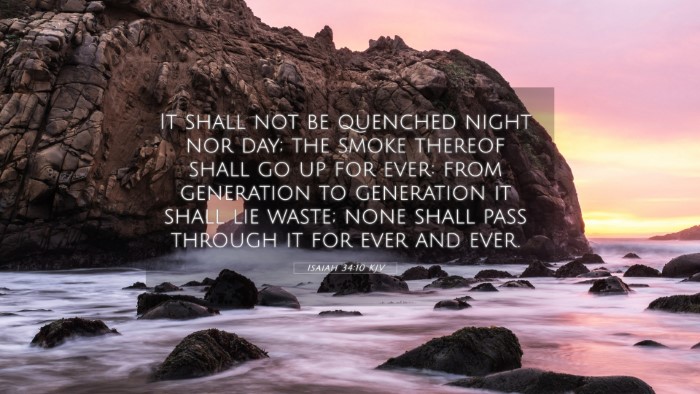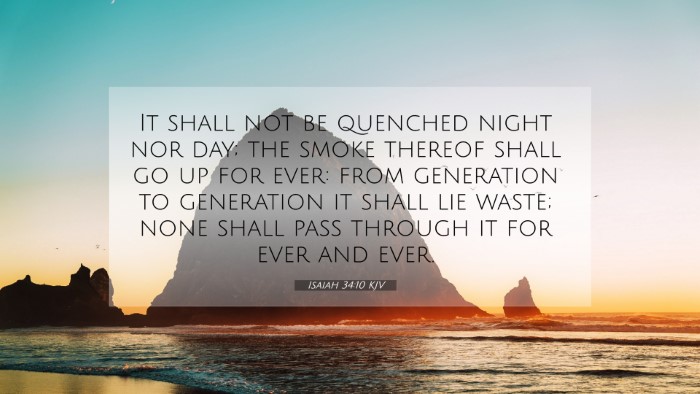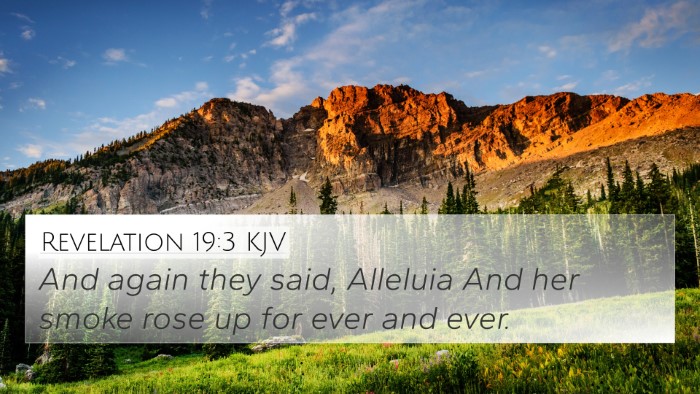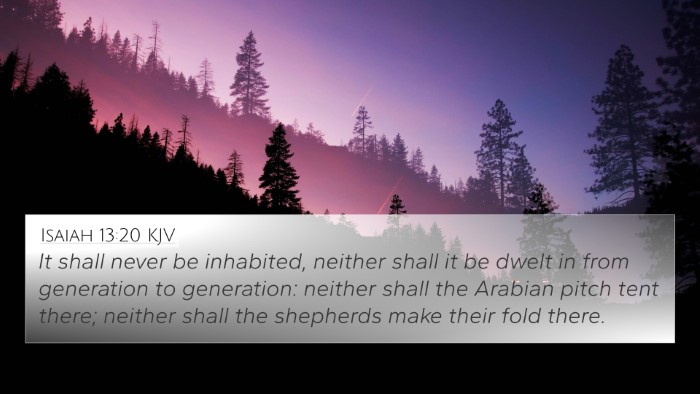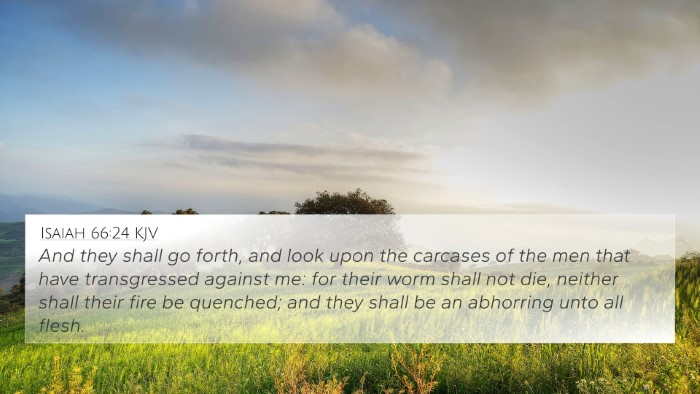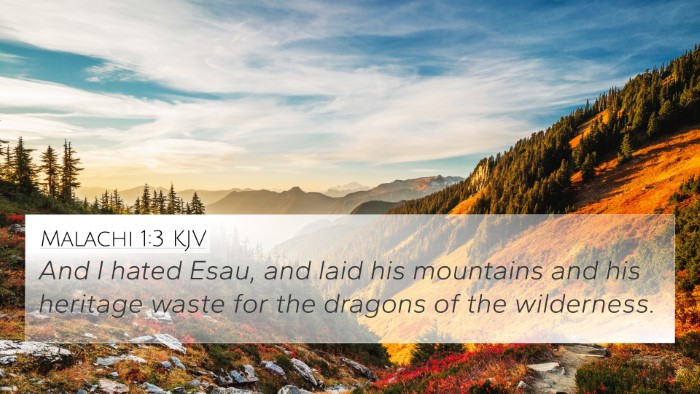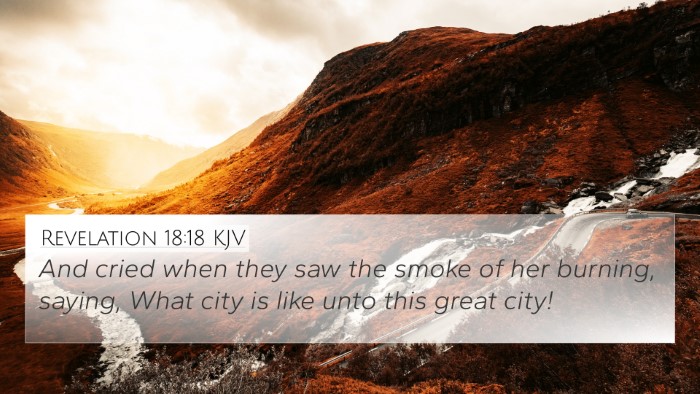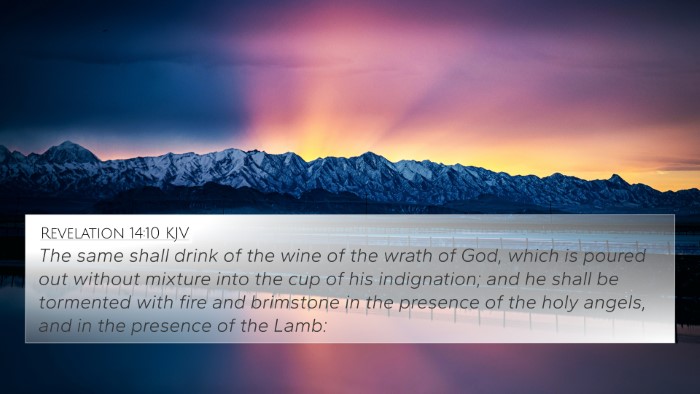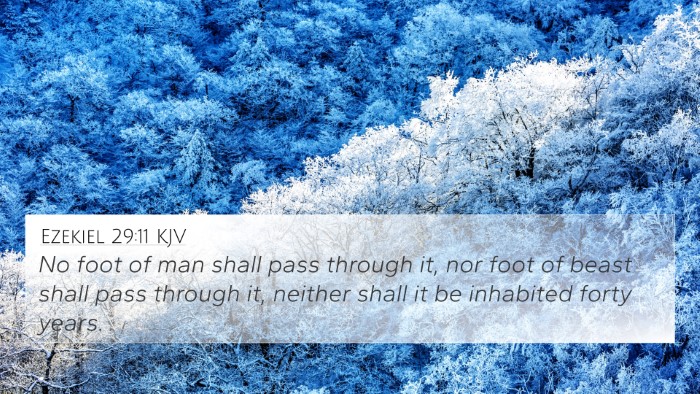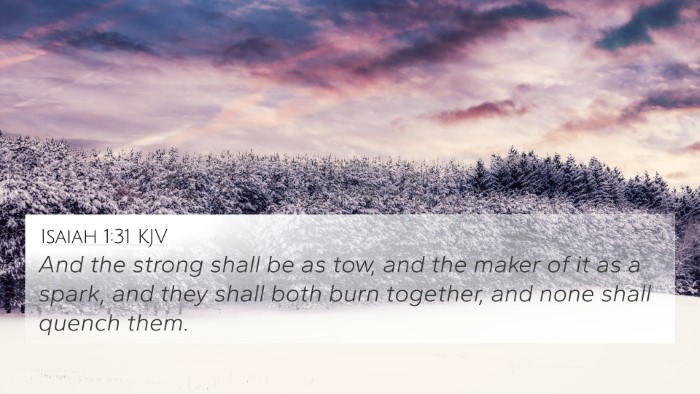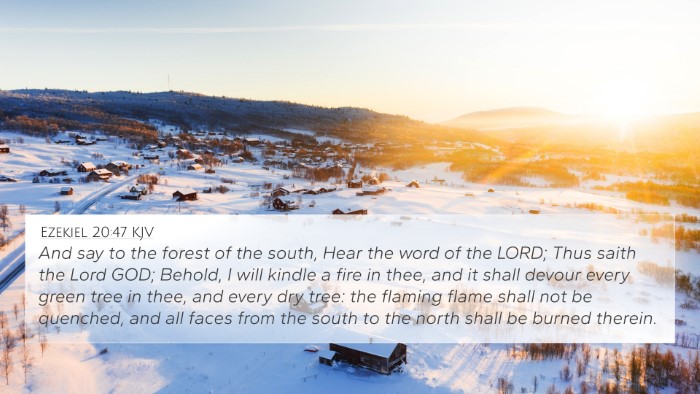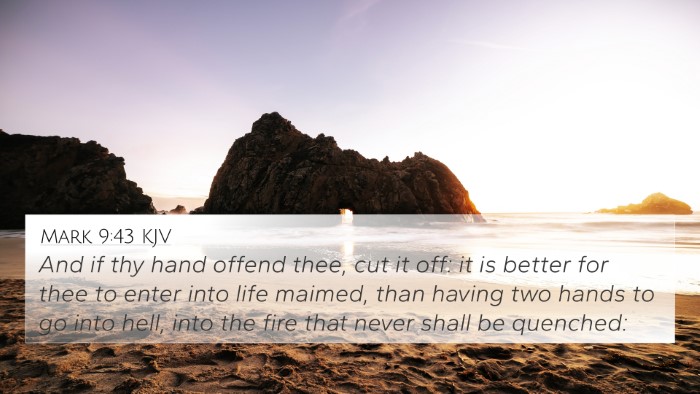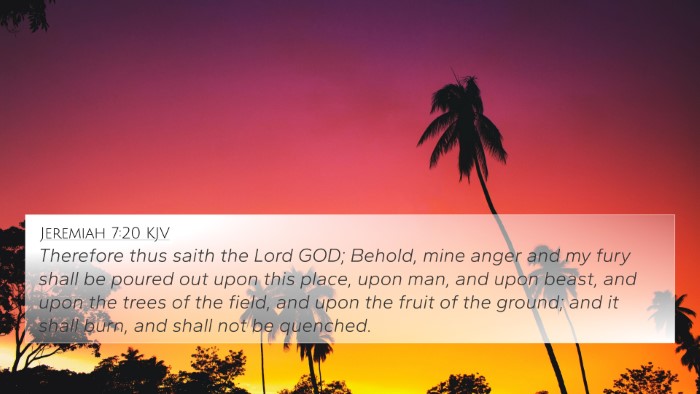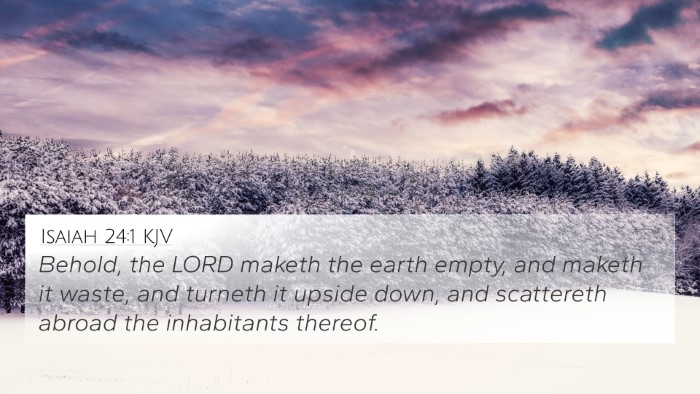Understanding Isaiah 34:10
Isaiah 34:10 states: "It shall not be quenched night nor day; the smoke thereof shall go up for ever: from generation to generation it shall lie waste; none shall pass through it for ever and ever." This verse depicts a scene of desolation and judgement. The imagery of eternal smoke and unquenchable fire emphasizes the seriousness of God's judgement upon the nations, especially Edom, which serves as a symbol for all opposition to God’s divine will.
Commentary Insights
This verse is a part of Isaiah's prophetic messages concerning the judgement of God. Scholars and commentators have provided various insights into its meanings.
-
Matthew Henry highlights the permanence of God's judgement, indicating that the desolation described is not temporary but eternal. Henry notes that the smoke rising forever symbolizes God's continual judgement and that the land will remain void of life, serving as a caution against rebellion.
-
Albert Barnes interprets the phrase "none shall pass through it for ever and ever" to emphasize the total desolation of the land. He suggests this indicates a complete cessation of activity in a place marked by divine judgement, reinforcing the notion that divine retribution leads to utter destruction.
-
Adam Clarke elaborates on the historical context by noting that Isaiah predicted the downfall of Edom, a nation that opposed Israel. This judgement acts as a symbolic representation of God's justice upon nations that stand against His people and His commandments.
Cross-References and Thematic Connections
Understanding Isaiah 34:10 becomes more profound when we examine its connections to other biblical texts. Here are some cross-referenced verses that reflect similar themes of judgement and desolation:
- Revelation 14:10-11 - This passage describes the eternal torment of those who oppose God, paralleling the image of unquenchable fire and perpetual smoke.
- Jeremiah 49:17 - Similar to Isaiah's prophecy, this verse speaks of the desolation of Edom as a confirmed judgement.
- Matthew 18:8-9 - The imagery of everlasting fire here connects to the warning against sin and the consequences it brings, much like the judgement described in Isaiah 34.
- Mark 9:43-48 - Jesus talks about the unquenchable fire, serving as a thematic connection to the eternal nature of God's judgement depicted in Isaiah.
- Lamentations 5:18 - The desolation of Zion has parallels with the barren wasteland referenced in Isaiah 34:10, reflecting the overarching theme of divine judgement.
- Obadiah 1:10-16 - This entire chapter focuses on the judgement of Edom, directly correlating with Isaiah's message.
- 2 Peter 3:7 - The comparison of God’s judgement through fire serves as a thematic link to Isaiah 34’s portrayal of finality and destruction.
- Hebrews 12:29 - Highlighting God as a consuming fire resonates with the powerful imagery in Isaiah, emphasizing His divine nature and the seriousness of His judgement.
- Isaiah 66:24 - This verse discusses the everlasting punishment of the wicked, linked to the smoke and desolation mentioned in Isaiah 34.
Tools for Bible Cross-Referencing
To deepen your understanding of Isaiah 34:10, utilizing comprehensive tools for Bible cross-referencing can be beneficial. Here are some recommended resources and methods:
- Bible Concordance: A concordance helps identify where specific words and themes appear throughout the Bible, aiding in finding related scriptures.
- Bible Cross-Reference Guide: Guides that summarize thematic connections between verses can enhance your study of inter-biblical dialogue.
- Cross-Reference Bible Study: Engage in structured study sessions focusing on connecting different verses and their meanings in context.
- How to Use Bible Cross-References: Learn effective methods to identify and apply connections for a richer understanding of scripture.
- Bible Reference Resources: Utilize reference books like Smith’s Bible Dictionary or topical index to deepen your insights.
- Bible Chain References: Study methods that link verses together based on themes provide a systematic approach to understanding scripture.
Conclusion
Isaiah 34:10 serves as a stark reminder of God's judgement and the consequences of opposition against Him. Through careful examination and cross-referencing, one can gain a deeper insight into the nature of God’s justice. This combined interpretation from prominent public domain commentaries aids readers in grasping not only this verse's immediate implications but also its broader theological significance within the biblical narrative. By studying cross-references, believers can appreciate the interconnectedness of scripture and how themes of judgement, resurrection, and divine justice run throughout the Bible.
